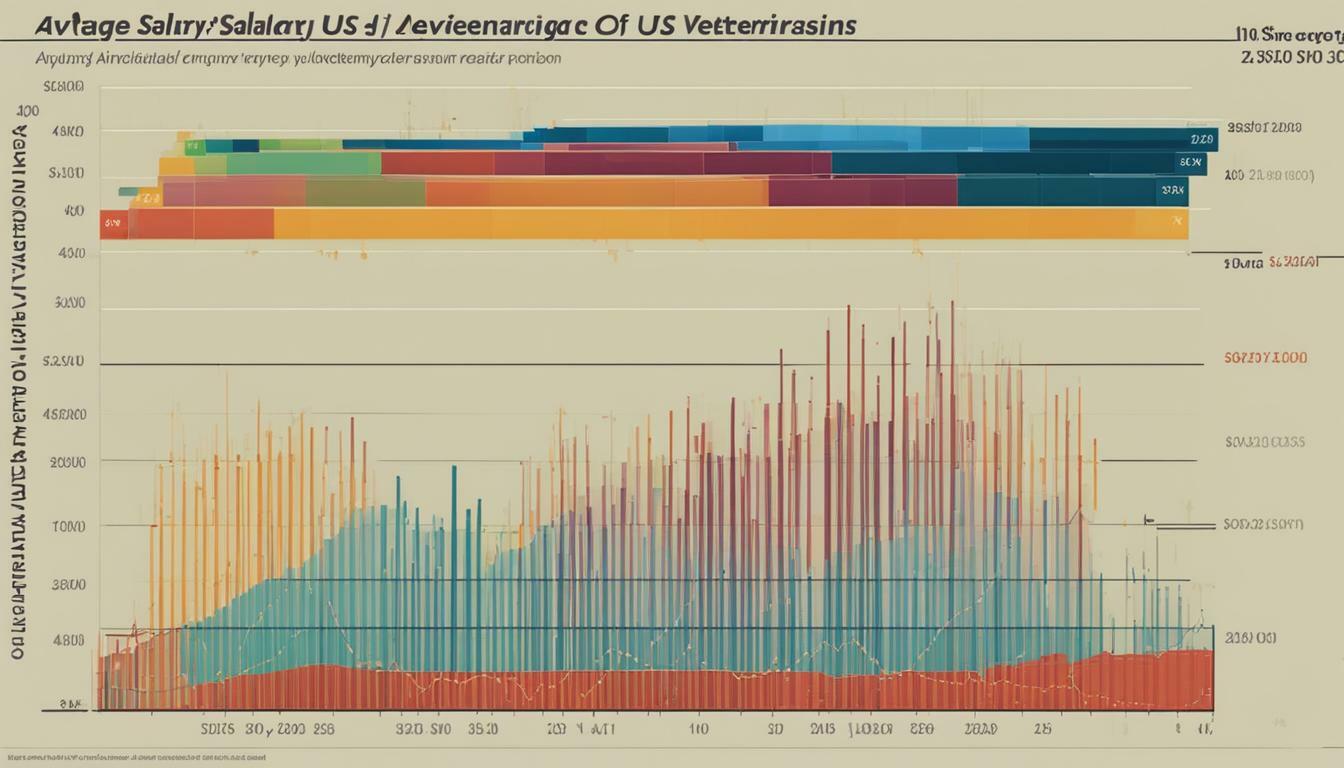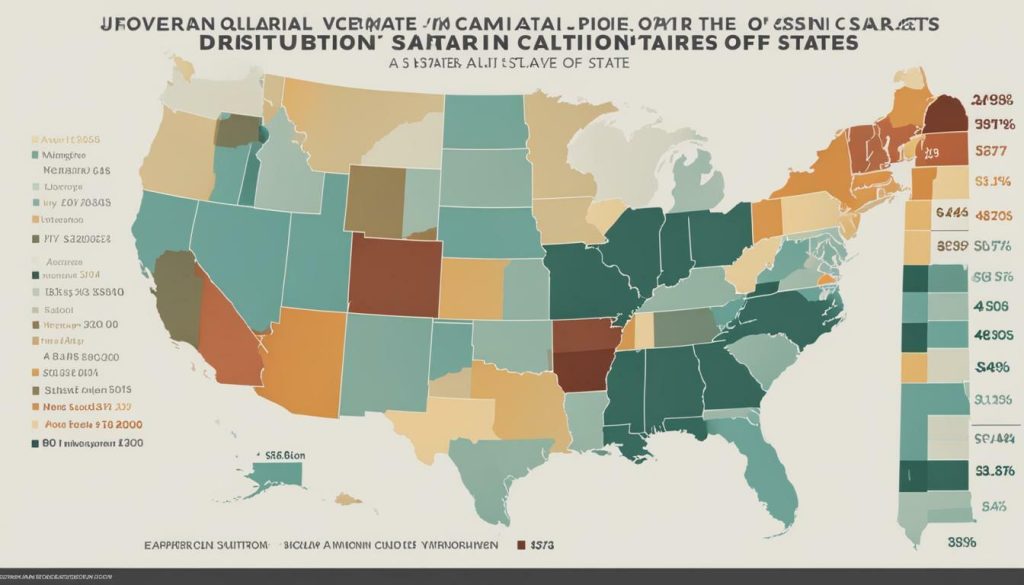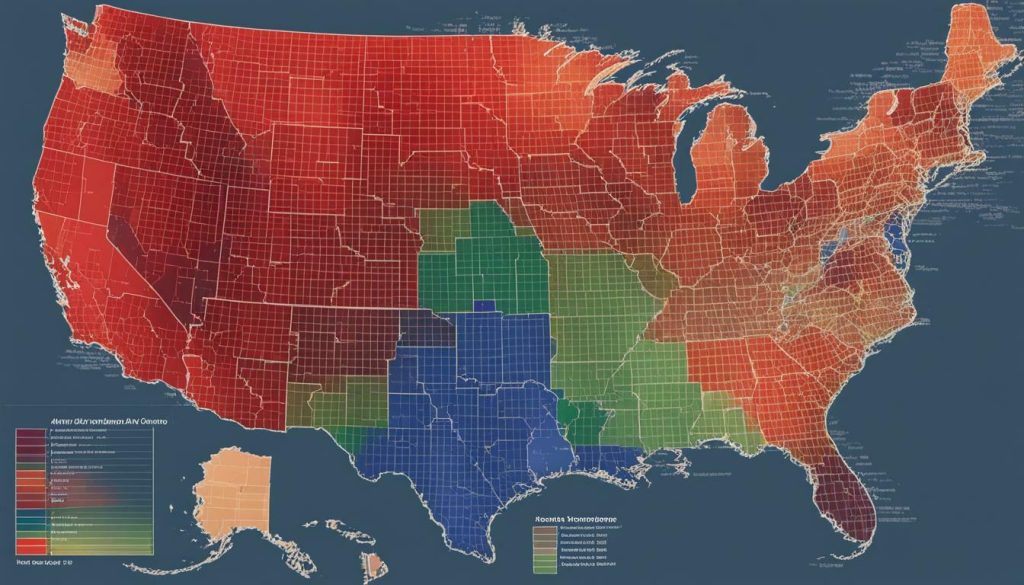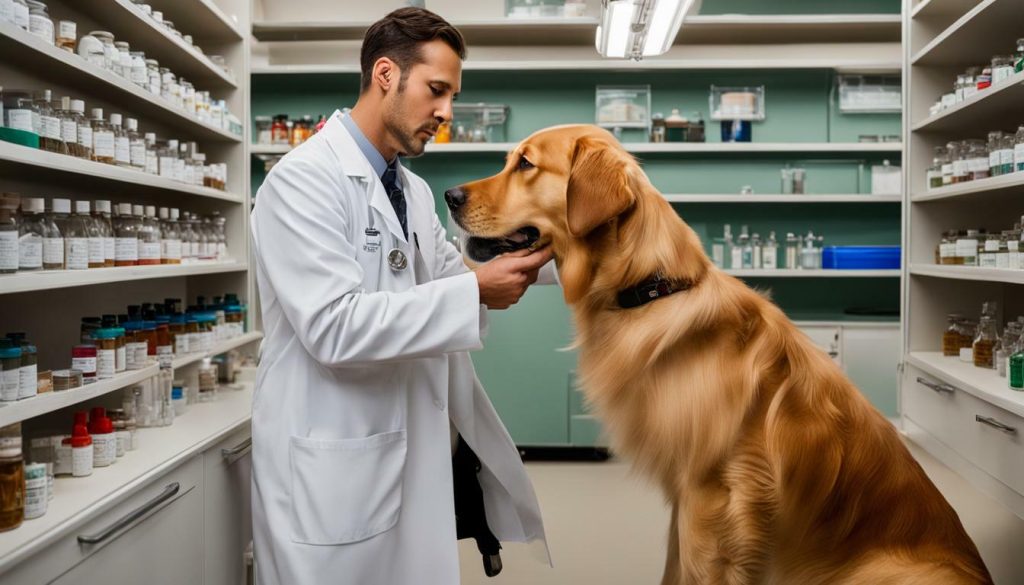
Curious about how much veterinarians earn in the US? Let’s uncover the truth about veterinarian salary. In this section, we will dive deep into the intriguing world of US veterinarian salaries. We will explore the average salaries, statistics, and factors that influence how much veterinarians earn in the United States.
- The average veterinarian salary in the US is around $100,000, but it can vary based on factors such as location, type of practice, and years of experience.
- Starting salaries for veterinarians can be much lower, and the debt-to-income ratio for veterinary graduates is 1.67:1.
- Factors that impact veterinarian salaries include industry experience, location, and type of practice.
- Different states and metropolitan areas have different average salaries for veterinarians, with Washington, D.C., Connecticut, and Rhode Island reporting the highest averages.
- The type of practice also plays a role, with salaries varying in different settings such as colleges, universities, professional schools, and general medical and surgical hospitals.
- The decision to become a veterinarian should be weighed carefully considering the high cost of education and potential student debt.
- Despite the financial investment, veterinarians are typically well-paid and can find fulfillment in their career.
Factors Affecting Veterinarian Salaries
The salary of a veterinarian can be influenced by several factors, including location, type of practice, and industry experience. These factors play a significant role in determining the earning potential for veterinarians in the United States.
One of the key factors that can impact a veterinarian’s salary is their location. Different states and metropolitan areas have different average salaries for veterinarians. According to data from the Bureau of Labor Statistics, as of May 2020, the highest average wages for veterinarians were reported in Washington, D.C., Connecticut, and Rhode Island. On the other hand, states like Mississippi, Oklahoma, and Idaho had lower average salaries in comparison.
| State | Average Annual Salary |
|---|---|
| Washington, D.C. | $146,110 |
| Connecticut | $132,460 |
| Rhode Island | $131,350 |
The type of practice also plays a significant role in determining a veterinarian’s salary. Salaries can vary between different practice settings, such as colleges, universities, professional schools, and general medical and surgical hospitals. According to the American Veterinary Medical Association, veterinarians working in academia and research tend to have higher salaries compared to those in private practice or government positions. The average annual salary for veterinarians in colleges and universities was reported to be $133,630, while those working in general medical and surgical hospitals earned an average of $110,560.

“The salary of a veterinarian can vary based on several factors, including location, type of practice, and years of experience.”
Industry experience is another crucial factor that can influence veterinarian salaries. Veterinarians with more years of experience and specialized expertise may have higher earning potentials. For example, veterinarians who specialize in areas such as internal medicine, surgery, or dermatology may earn higher salaries compared to general practitioners. The additional education and training required for specialization contribute to increased earning potential.
In conclusion, the salary of a veterinarian in the United States can vary significantly depending on location, type of practice, and industry experience. It is important for aspiring veterinarians to consider these factors when considering their career path. While the high cost of education and potential student debt should be taken into account, veterinarians are typically well-compensated for their work, and the field offers opportunities for personal fulfillment and growth.
Average Veterinarian Salary in the US
Wondering what the average veterinarian earns in the US? Let’s explore the average salary, yearly earnings, and the highest paying specialties in the field.
According to statistics, the average veterinarian salary in the United States is approximately $100,000 per year. However, it is important to note that this figure can vary depending on various factors. Location, for example, plays a significant role in determining a veterinarian’s earning potential. Certain states and metropolitan areas tend to offer higher average salaries for veterinarians. Washington, D.C., Connecticut, and Rhode Island are among the top regions with the highest veterinarian salary averages.
Industry experience and years of practice also impact how much a veterinarian can earn. While starting salaries for veterinarians may be lower, the earning potential tends to increase with more experience. It is essential to consider these factors when evaluating a veterinary career and its financial aspects.
| Highest Paying Veterinarian Specialties | Median Annual Salary |
|---|---|
| Board-certified veterinary anesthesiologist | $220,000 |
| Board-certified veterinary surgeon | $202,000 |
| Board-certified veterinary radiologist | $177,000 |
| Board-certified veterinary dermatologist | $175,000 |
Specializing in certain areas of veterinary medicine can also lead to higher salaries. Board-certified veterinary specialists in fields such as anesthesiology, surgery, radiology, and dermatology tend to earn more than general practitioners. Pursuing a specialization can be a rewarding path for those looking to maximize their earning potential in the veterinary field.

To summarize, the average veterinarian salary in the US is around $100,000 per year, with location, experience, and specialization playing a significant role in determining earning potential. While the cost of education and potential student debt should be considered, the field of veterinary medicine offers fulfilling careers that can also be financially rewarding.
Veterinarian Salaries by State
Are you curious about how veterinarian salaries differ from state to state in the US? Let’s explore the variations and discover the states with the highest average salaries.
When it comes to veterinarian salaries, different states and metropolitan areas in the US offer varying earning potentials. According to the Bureau of Labor Statistics, as of May 2020, the average annual salary for veterinarians in the United States was approximately $105,240. However, this figure can fluctuate considerably based on several factors, including geographical location and demand.
| State | Average Salary |
|---|---|
| Washington, D.C. | $167,580 |
| Connecticut | $125,810 |
| Rhode Island | $125,560 |
| New Jersey | $124,870 |
As illustrated in the table above, Washington, D.C., tops the list with the highest average salary of $167,580, followed by Connecticut and Rhode Island. These states not only provide lucrative earning opportunities but also boast a high concentration of veterinary jobs, resulting in increased demand for skilled veterinarians.
On the other hand, states such as Arkansas, Oklahoma, and Mississippi tend to have lower average salaries for veterinarians. While these states may offer a lower cost of living, the demand for veterinarians and the earning potential may not be as high.
It’s important to note that the cost of living, affordability, and other factors can also influence the overall attractiveness of a state for veterinarians. When considering career opportunities, aspiring veterinarians should carefully weigh the financial aspects, regional demand, and potential for growth in their chosen state.

Types of Practice and Veterinarian Salaries
The type of practice can have a significant impact on a veterinarian’s salary. Let’s explore the earning potential in different practice settings.
1. Colleges and Universities: Veterinarians working in academic institutions such as colleges and universities often have the opportunity to combine their clinical practice with teaching and research. While salaries in this setting may not be as high as some other practice types, the added benefits of job security and the ability to shape the future of veterinary medicine make it an attractive option for many. According to the Bureau of Labor Statistics (BLS), the average annual salary for veterinarians in educational services is $106,120.
2. Professional Schools: Another practice setting for veterinarians is professional schools, which can include veterinary medical schools and animal hospitals associated with these institutions. Veterinarians in this field often have access to advanced technology and resources, allowing for specialized care and research. Salaries for veterinarians working in professional schools can vary depending on the level of experience and specialization, with highly specialized fields such as veterinary surgery commanding higher salaries. The BLS reports that the average annual salary for veterinarians in the scientific research and development services industry, which includes professional schools, is $155,320.
3. General Medical and Surgical Hospitals: Veterinarians employed in general medical and surgical hospitals provide primary care for animals, including diagnosing and treating illnesses, performing surgeries, and advising pet owners on preventive care. Salaries in this setting can vary depending on the location, size of the hospital, and level of experience. According to the BLS, the average annual salary for veterinarians in general medical and surgical hospitals is $106,000.
Overall, the choice of practice setting should be based on individual preferences, career aspirations, and personal goals. While salaries can vary, veterinary medicine offers the opportunity to make a difference in the lives of animals and their owners, providing a fulfilling and rewarding career path.

- The type of practice can significantly impact a veterinarian’s salary.
- Colleges and universities offer job security and the chance to shape the future of veterinary medicine.
- Professional schools provide access to advanced technology and resources, with specialized fields commanding higher salaries.
- General medical and surgical hospitals offer primary care for animals, with salaries varying based on location and experience.
| Practice Setting | Average Annual Salary |
|---|---|
| Colleges and Universities | $106,120 |
| Professional Schools | $155,320 |
| General Medical and Surgical Hospitals | $106,000 |
Considering Veterinarian Salary as a Career Choice
Aspiring to be a veterinarian? It’s important to consider the financial aspects, including the cost of education and potential student debt, alongside the promising earning potential and fulfillment in this animal-loving career.
The average veterinarian salary in the US is around $100,000, but it can vary based on factors such as location, type of practice, and years of experience. Starting salaries for veterinarians can be much lower, and the debt-to-income ratio for veterinary graduates is 1.67:1.
Factors that impact veterinarian salaries include industry experience, location, and type of practice. Different states and metropolitan areas have different average salaries for veterinarians, with Washington, D.C., Connecticut, and Rhode Island reporting the highest averages.
The type of practice also plays a role, with salaries varying in different settings such as colleges, universities, professional schools, and general medical and surgical hospitals. While the cost of education can be high, and student debt is a consideration, veterinarians are typically well-paid and can find fulfillment in their career.
FAQ
What is the average veterinarian salary in the US?
The average veterinarian salary in the US is around $100,000, but it can vary based on factors such as location, type of practice, and years of experience.
How much do starting veterinarians earn?
Starting salaries for veterinarians can be much lower than the average, depending on various factors.
What is the debt-to-income ratio for veterinary graduates?
The debt-to-income ratio for veterinary graduates is 1.67:1, indicating that the average student debt is higher than the average salary.
What factors can impact veterinarian salaries?
Factors that can impact veterinarian salaries include industry experience, location, and type of practice.
Which states have the highest average veterinarian salaries?
The states with the highest average salaries for veterinarians are Washington, D.C., Connecticut, and Rhode Island.
How does the type of practice affect veterinarian salaries?
Salaries can vary depending on the type of practice, such as colleges, universities, professional schools, and general medical and surgical hospitals.
Should I consider the veterinarian salary as a career choice?
The decision to become a veterinarian should be weighed carefully considering the high cost of education and potential student debt. However, despite the financial investment, veterinarians are typically well-paid and can find fulfillment in their career.



